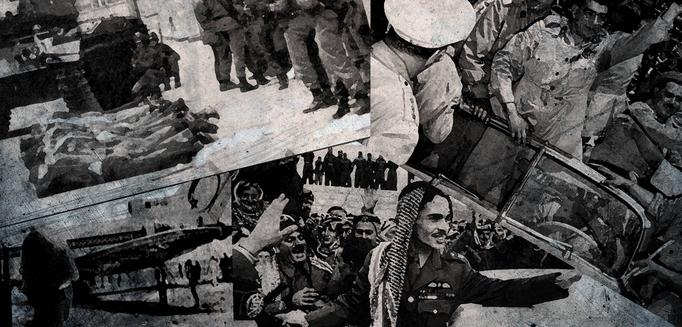Lady of Paradise ... a stereotype for a different history on the film project: between Yasser Al -Habib and his opponents The story of the film: Al -Zahraa from a Shiite perspective. A stereotype of dialectical history
On the tenth of last December, the Lady of Heaven movie began to be shown by cinemas in the United States of America.
The film, which was supervised by the extremist Shiite cleric Yasser Al -Habib, tells the biography of Mrs. Fatima Al -Zahra, the daughter of the Prophet Muhammad, through a set of novels considered in the Imami Shiite doctrine, which clearly contradicts the traditional historical narrative in the Sunni circles.
Although it is difficult to officially display in the cinema halls in the Arab countries, the film's copy is spreading on some websites, it has created a kind of Sunni-Shiite sectarian controversy, which may increase in the coming period.
Yasser Al -Habib is a Shiite cleric who used to make a lot of controversy in the past years.He was born in Kuwait in 1979 AD, and it was included in the regular educational schools and institutes, as well as the Shiite religious sciences in the Iranian city of Qom.
After returning to Kuwait, Al -Habib was known for his excitement of sectarian intolerance, and this led to an excitement of anger and discontent against him, which led the Kuwaiti government to arrest him, to issue some judicial rulings that sentenced him to about twenty years in prison.After several months of prison, he was released in mysterious circumstances, so he traveled to England and founded there "Khaddam Al Mahdi Commission", whose activities focused on calling for the Shi'al Imami doctrine, and in 2016 announced the controversial film production project.
According to the information available about the film, Sheikh Yasser Al -Habib was the one who supervised himself to prepare the scenario and dialogue, while Elie King directed it, while a large number of actors from England and the United States of America participated.
The film, which spanned two hours and twenty -one minutes, reached fifteen million US dollars, which was the amount collected from the outcome of the Shiite donations organized by the Fadak satellite channel - Yasser Al -Habib - starting from 2016, and lasted for nearly four full years.
الاعتراضات على الفيلم بدأت منذ فترة مبكرة، إذ وجهت له الانتقادات بسببموضوعه المثير للجدل، فأعلن الكثير من السياسيين ورجال الدين معارضتهم لمشروع إنتاجه،وعدّوه مؤامرة غربية تستهدف النيل من المسلمين، وأن هدفه الرئيس هو إثارة الفتنوالأحقاد بين المذاهب المختلفة، على سبيل المثال، أشار أمين المجلس الأعلى للأمنالقومي الإيراني الأسبق، علي شمخاني، إلى الخطورة البالغة التي يمثلها الفيلم، فقال: "تعتمدالسياسات الغربية، والعبرية، والعربية على استراتيجية التقسيم، حيث تقوم مرةبإنشاء داعش الإرهابي، ومرة أخرى بإنتاج عمل سيدة الجنة".In the context, Ayatollah Sheikh Al -Jafar Al -Sabhani advised the prohibition of donating to produce this film, and he said: "...The production of such a film achieves only the demands of the enemies, which is far from reason and piety, and on this, the production of desertion and any financial assistance to it, cooperates in sin..
The main plot of the film depends on the movement between two parallel stories, the first story, present, contemporary, which take place in Iraq, while the second, it is old, has passed over more than a thousand and four hundred years, and its strings were woven in the Arabian Peninsula..
The events begin with the facts of the ISIS forces invading the Iraqi city.In conjunction with the presentation of quick footage of some of the hideous crimes practiced by ISIS forces during that period, the story of the widow Fatima, who stormed the ISIS elements, and killed her in front of her son Laith's eyes, before the popular crowd clashed with them, to find himself after him living in Baghdad with a pioneer,Al -Jandaqi, who saved him, and his mother, and in an attempt to reassure the orphan child, and his risk..
The film chose to move away from the controversy related to determining the year of the birth of Al -Zahra..After the scenario, the scenario is on the review of what was stated in the city newspaper, which carried the details of the agreement complicated by the Messenger, the tribes of Yathrib and the Jews, which can be explained by the fact that the film is directed to the Western viewer in the first place.
Ali's marriage to Fatima will receive a lot of attention, and how she - that is, Fatima - asked her father to be her dowry is to intercede for the mistake to enter Paradise, which is a dramatic addition.As for the first war confrontation that will be highlighted, it is the battle of one whose facts took place in the third year of immigration, and the focus will be on some important events that have a cabinet in the Shiite imagination, including for example, Hamza bin Abdul Muttalib was killed, and the heroic role that Ali bin Abi playedHe demanded in the battle, and his desperate defense of the Prophet, especially after his sword was broken, to give him the Apostle Saif Dhi Dhi al -Faqar, in which the Malakberl descended from heaven.In another context, the film highlighted the escape of Omar bin Al -Khattab from the battlefield, and its contradiction to the command of the Prophet, and the brutality of Hind bint Atab.
After that, the film dealt with the clothing incident, when the Prophet gathered his daughter and her husband and his grandson, and covered them with one clothing, and called them, which is the incident that is extremely important in the collective Shiite imaginations, due to her association with the concepts of the infallibility of the family of the house and their absolute purity.In the context, the film dealt with the Ghadeer Khum incident, which is celebrated by the Imami Shiites annually on the eighteenth.

In the last part of the film, the events dealt with the attempts made by the hypocrites to assassinate the Messenger in the Tabukiya Aqaba in the ninth year of migration, and tucked the sky at the hands of some of his husbands, his death and Ali was busy washing and shrouding him, while Abu Bakr Al -Siddiq managed to persuade Muslims to choose him as a caliph in a shedBani Sa`da.
In the same context, the events focused on the details that followed the disagreement of Abu Bakr, as it reviewed the stability of the four pillars - Ammar bin Yasir, Al -Miqdad bin Amr and Abu Dharr Al -Ghaffariolmelman Al -Farsi - with Ali, and their recognition of his right to take over the caliphate, retireTo collect the Qur’an, its explanations and interpretations, according to the will of the Messenger, and how when the Qur’an was offered to Muslims, they have rejected it and presented it.
The events reach their climax with the scene of the storming of Fatima's house, the setting of fire in it, how it was struck, broke her rib and dropped her pregnancy, and forced Ali to pledge allegiance after linking him to the ropes of his desire to the council of Abu Bakr, and how Al -Zahra carried her blood stained with blood and threatened Abiker and his supporters with the divine punishment that awaits them, so that lightning broke outIn the sky, people are afraid, before he asked her to stop praying so that the city does not destroy.
After that, the film touches on the seizure of the caliph on the land of Fadak, which is the plot of land, Fatima, you see her as a legacy and a right for her from her father, and how she was cut off in the house known to be sorrows, and it is the place where she was crying in sadness over the separation of her father and her people and her family, even if she approachesThe moment of her death, she recommended her husband to hide the place of her burial, then she died in peace, to end the story that she tells or a pioneer, and we return again to the present, to see Laha and he was influenced by what he heard from the biography of Al -Zahra, and how he was able to prevent one of his old friends from detonating himself with a beltI breathed in a Shiite mosque.
Although the choice of the personality of Mrs. Fatima Al -Zahraa specifically to be the axis of the dawn around which the events of the film can be justified - in the first place - that Al -Zahra is one of the importance of the sacred figures in the collective Imami Shiite memory, especially that it is one of the fourteen infallible among the Twelver Imami Shiites, it can be said that the choice of that personalityIt had an additional benefit, namely allowing the early period in the history of sectarian controversy in Islam, especially in the first months that followed the death of the Messenger, and what was interrupted with that period between the companions and the family of the house on the issues of power and succession.
Fast review of the film's evaluation of some international sites specialized in cinema, which would emphasize the success of the film in the admiration of many viewers.For example, the movie achieved 8 degree.3 IMDB movies on the Internet, while on the "spoiled tomatoes" website, the work achieved 75%.
It is possible to make sure of the fragility of these high assessments, if we notice the poor demand for the presence of the film in the cinema halls on the one hand, and if we pass on the popularity that the film achieved between the Shiites - especially in the extremist circles of them - the matter would confirm that the high assessments are notIt is associated with its technical quality, and that these evaluations are nothing more than just a natural resonance with a sectarian religious whisper. It is expected to flip the time of time.
In fact, it can be said that the filmmakers have tended to present a religiously- duplicate vision away from any objective eating- for a different historical period on it, which caused them to the trap.
For example, and despite the work makers that the Prophet’s faces and Ali Abi Talib have appeared through some modern graphic techniques, we will find that the Holy figures in the Shiite imagination - the Prophet, Ali, Hamza, Hassan, and the Hensing Salman Al -Farsi - may be adhered to, attesting to their white skin.The pure, tolerant faces, and their polite beard.On the complete contrast, the hated figures appeared in the Shiite imaginations - Abu Bakr Al -Siddiq, Omar bin Al -Khattab, Mrs. Aisha and Hind Bint Atab.
In the same context, the filmmakers worked to emphasize the centrality of the Imamate and the prophecy of the prophecy in many scenes, including the incidents of Al -Ghadeer and Al -Kisa, for example, and at the same time, they promoted the traditional Shiite view that confirms that the largest part of the Companions violated the Messenger, and that they had met with a hatredAli bin Abi Talib, without the elegance of the film, is a clear reason that explains the reason for this situation.
In general, the film did not provide a real artistic addition regarding the historical works that dealt with the era of early Islam, as its treatment came close to many previous treatments, and if it disagreed with it all at only one point, which is that it was presented the history of that era through a purely Shiite point of view.
Fatima Al -Zahra in the Sunni and Shiite imaginations
A mixed prayer led by a woman ... "Fatima Mosque Project" welcomes everyone
Achilles heel, Shamson's poetry, and Fatima's face...Body miracles and secrets
More
Let's get to know
سجل في الفيسبوكسجل مع جوجلأوYou agree to receive our news messages and our offers.You can unsubscribe at any time.*
By creating this account, you acknowledge the readings of the service and privacy policy and you accept them.
تسجلdo you have an account? sign in










